Enough random asides, back to the big picture strategy. Research continued to Civil Service, then sidetracked to Iron Working to have legion upgrades ready if necessary, then on to Education - Acoustics. I reached Education about turn 100 and started buying five Research Agreements over the next few turns. (That meant I had to stop buying settlers and build a few instead.)
I bought about three missionaries with faith, then let it accumulate to the enhancement Prophet. I took the usual king Religious Texts, which works better than Itinerant Preachers on an Inland Sea map, since many of the extra tiles IP would reach don't exist. And the second follower belief was my usual standby, Religious Community. (Actually I should have taken RC on founding instead of pagodas, since it turned out I hadn't bought any pagodas yet. Although the AI sometimes swipes Pagodas but I've never seen it take RC.)
As I mentioned in the intro, this game went full Tradition ignoring Liberty. As I mentioned in the policies article, Tradition always feels infinitely smoother compared to Liberty. It gives the opener culture, then monuments, then capital food, then the wonder bonus, then happy, then aqueducts, all timed just as you need each.
Here I finished Tradition on turn 85. One more policy came before the Renaissance, which went into the Patronage opener, that would do the most out of a very small set of options (Liberty or Honor or Commerce openers.) But the next policy was the big one.

I shot the Oracle to the Rationalism opener. This move by itself makes for sufficient justification for the National College expansion pause. Now I would be a policy ahead of pace in Rationalism throughout the entire game.
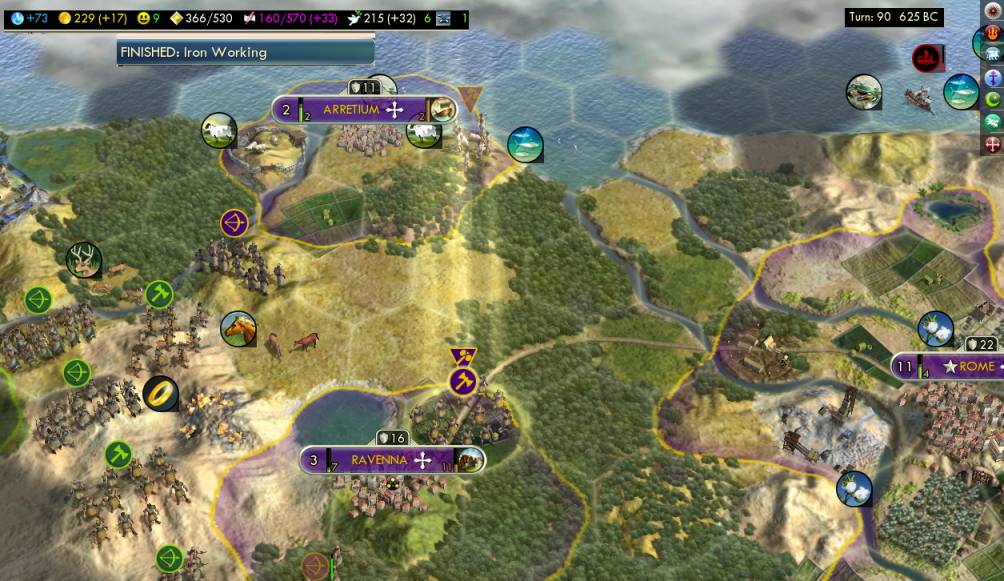
Arabia to my west telegraphed a war declaration. Fortunately I'd picked up Iron Working and a couple legion upgrades. Something went wrong with the Arabia AI though. He marched right past Ravenna all the way east to Rome, probably having made the decision to sneak attack Rome before Ravenna was founded, but then turned around and spent another ten turns walking back to and surrounding Ravenna. (An unintended outcome of Civ 5 nerfing roads: "sneak" attacks develop very slowly, and are easy to spot and prepare.)
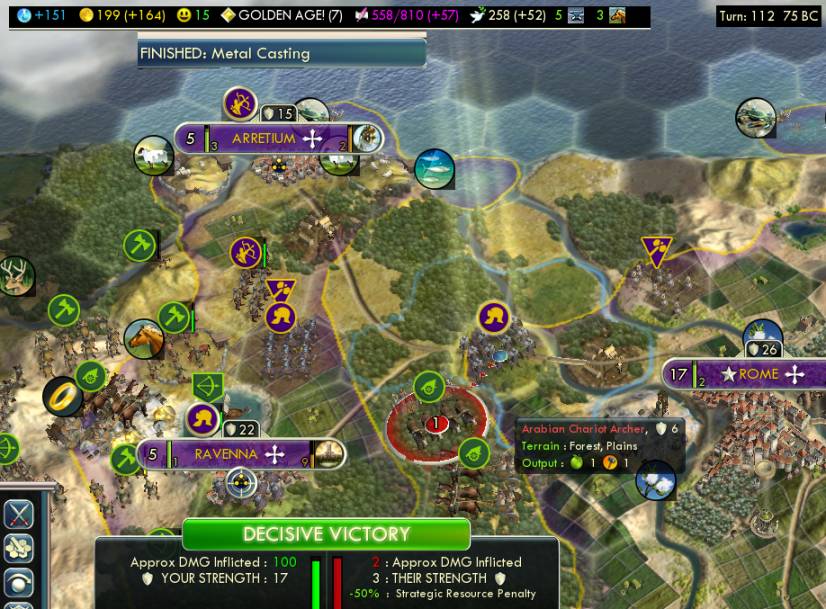
Twenty turns later he finally declared war. I was well prepared with two CBs and three legions, which could one-shot the glass ranged units. We fought for a few turns, me never in danger of course. Then:
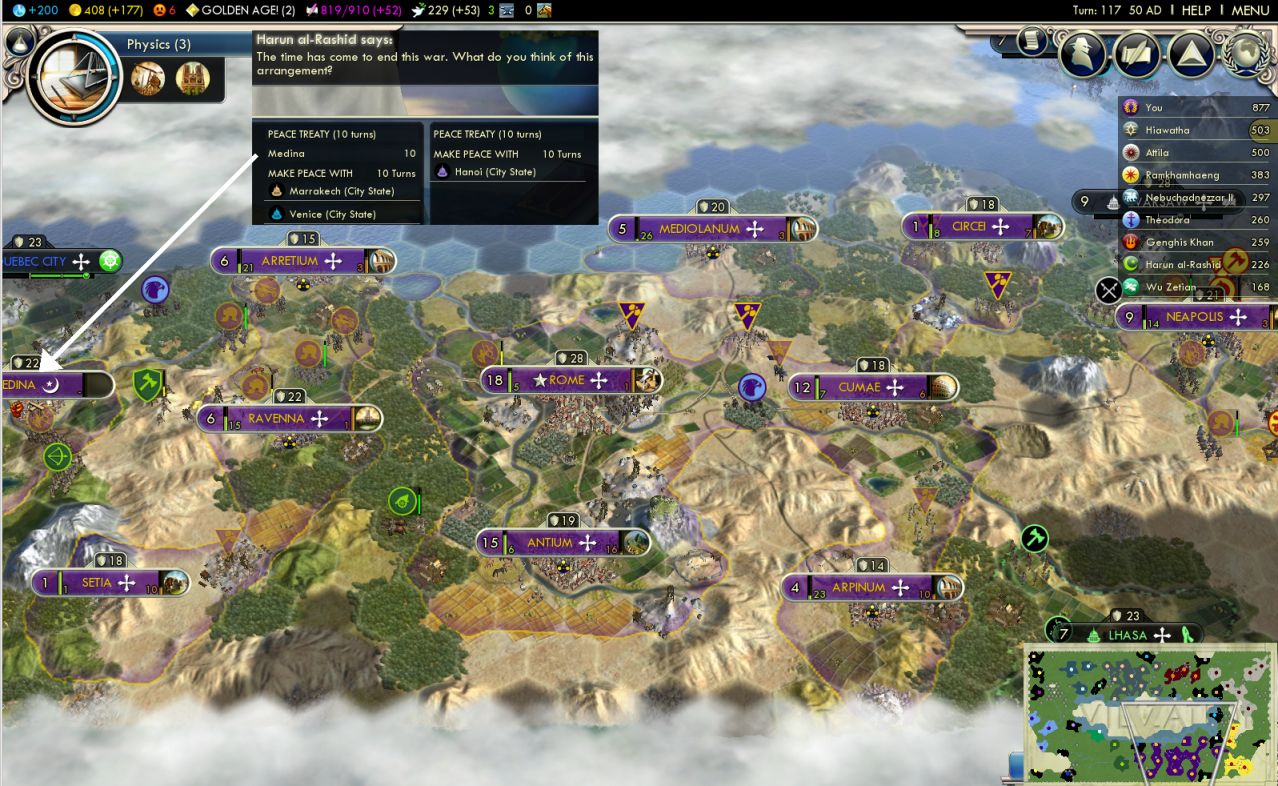
Wow. Despite me not dealing any real damage, Harun surrendered a really nice size-10 city for peace! I'll take that!
Medina sent me into unhappiness, but that was fixed just a few turns later with the Humanism policy kicking in on five universities.
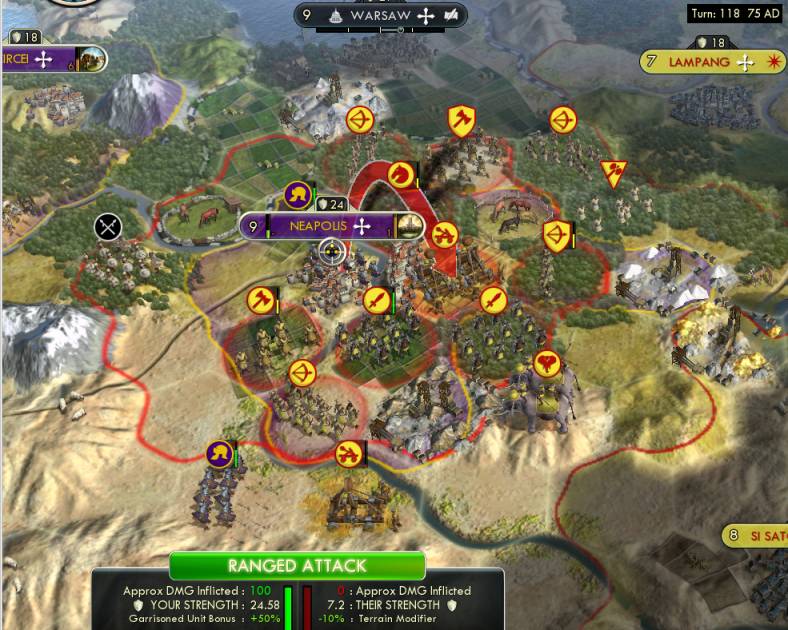
At the same time, I also had to deal with a war from Siam on the other side. Holy carpet of units... except... notice that none of that junk actually threatens the city. Neapolis one-shotted the lone catapult (hey, Oligarchy is actually pretty good) and the legions OHKOed several archers.
Funny note: I cheekily sold that salt for free money when Ramkham had a unit on it, expecting the pillage to cut off the sale. Then he didn't pillage so I was stuck without my salt for 30 turns.
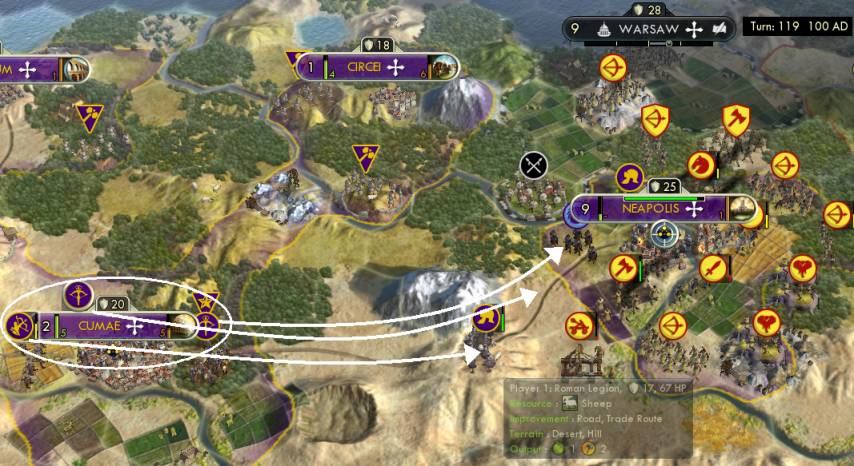
All the units from the Arabian war rushed to the new eastern front and turned the tide. Notice the careful tactics here: all three of those bowmen can get shots this turn if played right, moving exactly five tiles along roads then shooting. This sort of thing can be worked out by us humans, but is exceedingly hard for a computer to find. Look how many steps there are here: first the legion kills the catapult (to clear out its ZOC), then Neapolis plus one crossbow kills the warrior (also to clear its ZOC), then the next two bows can shoot the Siamese archer. It would actually take a ton of computational power to find that combination by brute force: remember that each of those bowmen has a decision space of about fifteen tiles it can reach, exploding into many thousands of permutations. We humans can apply generalized concepts of going towards the war area and moving as far as possible along roads before shooting, but that's treacherously difficult to express in computer code.
Anyway, I moved in on a Siamese city with that force and two ballistas - which surprisingly got killed long before they could conquer the city. Okay, I don't need to fight now. Siam was willing to concede a fringe city so I took it.
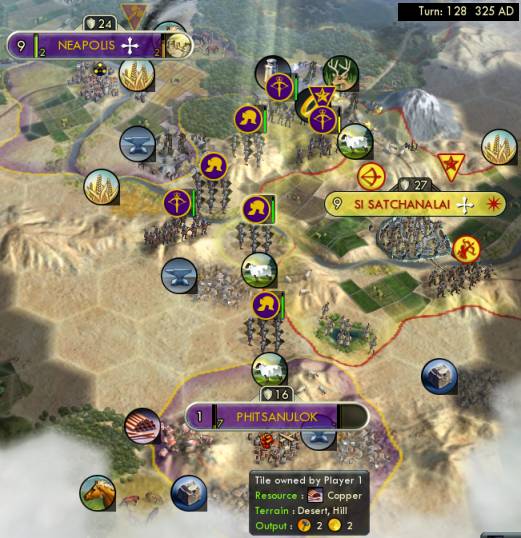
It'd never be worth annexing, but it's strictly positive as a puppet: the copper will pay for its own happy (and trigger some WLKTD), and the iron and horses will sell for money.
Thus ended my wars; I had no more in this game.
Speaking of happiness, now religion at this point was providing 30 happy between Ceremonial Burial and four pagodas. And also 5-10% production, and 8 pagoda culture. All for one single investment of 40 hammers at the beginning of the game. That's IT. I invested absolutely nothing else in the religion. That single shrine exploded via Desert Folklore to benefits that should cost many thousand hammers by way of colosseums and workshops and such. Religion in G&K has big Gappiness in its mechanics; weaksauce if played naively but a dominating force if played to the power options.
My first Great Scientist had settled as an academy, the obvious play with the early National College multiplying it. The second spawned on turn 137, a time when it's not immediately obvious which direction to go. Another academy could be 20 multiplied beakers per turn. Even though there were about 70 turns remaining, it should be figured as more like 150 turns of productivity, considering that the academy also contributes to 32 turns worth of Research Agreements and at least 48 worth of lightbulbs. 20 beakers x 150 turns is 3k beakers -- but endgame bulbs would exceed that by a great margin. So save him.

And this is slightly silly, but a Great Scientist sitting on his butt is still a spare unit and might as well go out exploring. And so he found the Rock of Gibraltar, the pesky last missing natural wonder. ![]() (How does a Great Scientist produce 120 hammers? By finding this and saving me the caravel I would have otherwise built.)
(How does a Great Scientist produce 120 hammers? By finding this and saving me the caravel I would have otherwise built.)
Now it was 800 AD, the time that I keep checking in on game comparisons. Let's look at this Rome versus my Korea game.
| Korea | Rome | |
| Beakers | 683 | 632 |
| Gold | 119 | 168 |
| Culture | 72 | 141 |
| Policies | 10.0 | 10.5 |
| Population | 128 | 140 |
| Researching | Electricity | Radio |
| Crops | 404 | 386 |
| MFG | 280 | 273 |
Very close. Korea is a bit ahead in beakers, but that's largely because Korea already had Free Thought while Rome went for Humanism instead. Korea's food lead comes from the Feed the World belief. Rome's actually ahead by one tech though, thanks to more RAs, and has much more happy headroom with Ceremonial Burial spread much more widely. And Rome is on track to finish Rationalism which Korea didn't, and Rome has Desert Folklore which should hit one additional faith Great Scientist at 2500.